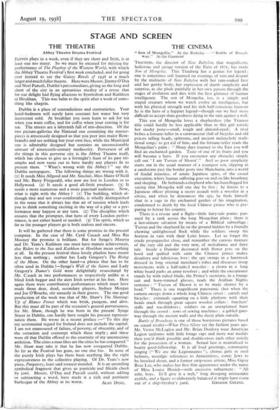THE CINEMA
" Son of Mongolia." At the Berkeley " Battle of Broad..
way." At the Gaumont
TRAUBERG, the director of New Babylon, that magnificent, ludicrous and savage version of the Paris. of 1871, has made Son of Mongolia. This Trauberg has a genius for legend ; one is sometimes still haunted on evenings of rain and despair by the midinette of New Babylon with her rain-soaked face and her gawky body, her expression of dumb simplicity and surprise, as she plods painfully in her own person through the stages of evolution and dies with the first glimmer of human intelligence. The son of Mongolia, too, is a simple and stupid creature whom we watch evolve an intelligence, but with his physical strength and his rich half-conscious humour he is the hero of a happier legend—though one we find more difficult to accept than goodness dying in the rain against a wall.
This son of Mongolia loves a shepherdess (the Trianon title could hardly be less applicable than to this girl astride her stocky pony—small, rough and almond-eyed). A rival bribes a fortune-teller in a caravanserai (full of bicycles and old priests telling beads, spittoons, and ancient melancholy tradi- tional songs) to get rid of him, and the fortune-teller reads the Mongolian's palm : " Many days journey to the East you will find an enchanted garden. Taste of one of its fruits and you will become a hero. If you encounter any obstacles simply call out ' I am Tseven of Shorot'." And so poor simplicity starts out in the usual manner of a youngest son, slipping in a sandstorm past the border posts into Manchuria, into a world of feudal injustice, of astute Japanese spies, of the casual execution, where human suffering goes on and on like breathing and sleeping. He befriends a shepherd who has been flogged for saying that Mongolia will one day be free ; he listens to a Japanese officer plotting a secret assault with a wrestler in a circus, and when he denounces the spy, he finds himself shut in a cage in the enchanted garden of his imagination, condemned to death by the local Chinese prince who is pre- paring to betray his country.
There is a rescue and a flight—little fairy-tale ponies pur- sued by a tank across the long Mongolian plain ; there is a last-minute salvation by means of a Biblical subterfuge : Tseven and the shepherd lie on the ground hidden by a friendly chewing unfrightened flock while the soldiers sweep the horizon in vain with their Lenz lenses. Let us forget the crude propagandist close, and remember the curious mixture of the very old and the very new, of melodrama and fairy tale. Inside a Daimler decorated with flower pots on the hood and quilted with satin the Chinese prince makes desultory and lubricious love : the spy swings in a hammock dressed in long oriental merchant's robes and discusses troop movements with a half-naked wrestler : a clown in a long white beard parks an army revolver ; and while the executioner stands by with naked blade, the Prince's secretary, in a lounge suit and horn-rimmed glasses, reads the Arabian Nights sentence : " Tseven of Shorot is to be made shorter by a head." There is one magnificent panoramic shot when the camera sweeps down a whole long Chinese street : camels and bicycles : criminals squatting on a little platform with their heads stuck through great square wooden collars : butchers' stalls and tea-drinkers ; soldiers on an unexplained hunt through the crowd : rows of sewing machines : a gabled gate- way through the ancient walls and the dusty plain outside.
Battle of Broadway is one of those boisterous pictures based on sexual rivalry—What Price Glory set the fashion years ago. Mr. Victor McLaglen and Mr. Brian Donlevy wear American Legion uniforms with little forage caps and more war medals then you'd think possible and double-cross each other noisily for the possession of a woman. Sexual lust is neutralised in hearty good-fellowship. It is all loud greetings, community singing (" We are the' Legionnaires "), chorus girls in steel helmets, nostalgic references to Armentieres, comic Jews to be knocked about, and a former strip-tease artiste, Miss Gipsy Rose Lee, who makes her first film appearance under the name of Miss Louise Hovick—with excessive refinement : " All reht, boys. Er'll give it a treh," long drooping aristocratic eyelids, and a figure so elaborately balanced it might have come, out of a ship-breaker's yard. GRAHAM GREENE.






































 Previous page
Previous page